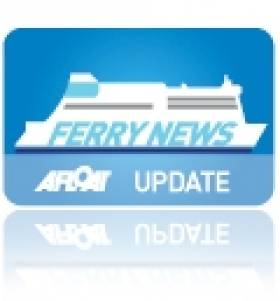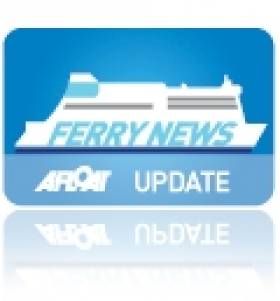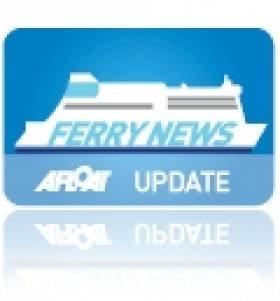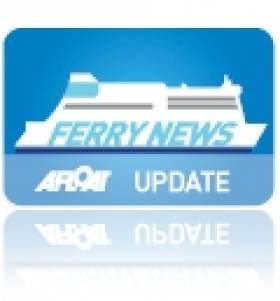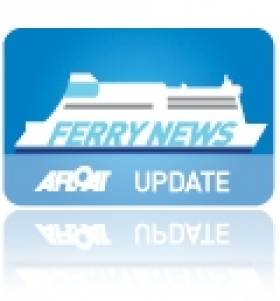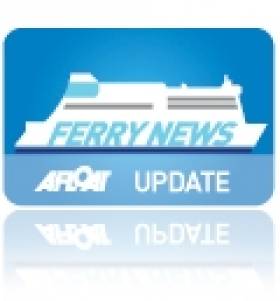Displaying items by tag: Irish Ferries
#France-Ireland - Minister for Transport, Tourism & Sport Leo Varadkar has welcomed a new direct French ferry route linking Cherbourg to Dublin as good news for Irish tourism and will build on the success of The Gathering.
"This weekly ferry route from Cherbourg to Dublin will provide tourists from France and mainland Europe with a direct car link into the capital. It will help us to build on the success of The Gathering in promoting Ireland as a visitor destination.
"Ireland is well catered for in terms of aviation access, and new aviation routes are announced on a regular basis. But as an island it's important that we give visitors plenty of options to bring their cars as well. Tourists on driving holidays tend to stay longer than those who fly, and are more likely to travel around the country."
Irish Ferries to Launch New Direct Dublin Port-France Route
#NewFerryRoute - Irish Ferries are to launch in 2014 a new direct passenger car ferry service linking Dublin with the French port of Cherbourg with the first sailing departing from Dublin Port on Saturday 18 January.
The once-weekly, year round service – which the company's head of passenger sales Dermot Merrigan says "will bring the European motorways directly into the heart of our capital city" – will depart from Dublin every Saturday (15.30) arriving into Cherbourg next morning (11.30). Return sailings will depart Cherbourg each Sunday (17.00) with early arrival back in Dublin on Monday morning (11.00).
The new route will be operated by the passenger car and freight ferry vessel mv Epsilon which Irish Ferries as previously reported on Afloat.ie has recently secured under a charter arrangement.
On its new Dublin to Cherbourg route, Irish Ferries will provide a third route option, augmenting the company's long-established services from Rosslare to Cherbourg and Rosslare to Roscoff. Sure to be popular with families and holidaymakers alike, this new direct service from Dublin is timed to arrive in Cherbourg early enough to facilitate easy onward travel to campsites and holiday centres throughout France.
With the introduction of the Epsilon and their new route from Dublin to Cherbourg, the intention on the part of Irish Ferries is to provide an economy-style service distinctly different from that operated by their cruise ferry Oscar Wilde which will continue to service routes from Rosslare to Cherbourg and Rosslare to Roscoff as before.
Because of the more limited range of cabins and passenger attractions on board the Epsilon when compared to the Oscar Wilde, Irish Ferries is seizing the opportunity to offer customers lower fares and an even broader choice of route options. In this way, the company is extending the appeal of a motoring holiday in France to an even wider segment of the market.
Built in 2011, the Epsilon has capacity for 500 passengers. Economy style facilities on board include a bar, cafeteria, self-service restaurant, two and four berth cabins, free wi-fi service and 2,860 lane metres of vehicle deck parking space.
Commenting further, Dermot Merrigan said "our new Dublin to Cherbourg direct service will appeal to those living within and beyond our capital city. Fast access straight through the city or via the Dublin Port Tunnel ensures that our new Ireland – France service will be more accessible to all."
Fares for this new Dublin to Cherbourg car ferry service are from €99 for a car & driver.
Oscar Wilde to Start New Extra Dublin-Holyhead Sailings
#NewFERRY - As previously reported on Afloat.ie, Irish Ferries introduction of Epsilon as a third vessel on the Dublin-Holyhead route will be in mid-December and not tomorrow as previously indicated, writes Jehan Ashmore.
During this interim period the new extra sailings will intially be operated by the company's French routes ferry Oscar Wilde. She is scheduled to run the extra sailings with two round-trips daily, with the first crossing departing Dublin Port in the early hours of tomorrow morning.
When the Epsilon (2011/26,375gt) the chartered Italian-flagged 500 passenger ro-pax ferry comes on stream next month she will take over the sailing roster of Oscar Wilde in the run up to the festive period schedule.
Currently there are no Rosslare-Cherbourg sailings and according to the operator's website, the French service resumes on 8 December.
Irish Ferries – An Ambitious Voyage: History Recorded in New Book
#AmbitiousVoyage - Irish Ferries and the story of its involvement in the development of passenger and freight ferry services between Ireland, UK and Continental Europe is the subject of a new book entitled 'Irish Ferries – An Ambitious Voyage' .
The book distributed by Easons and on sale through bookshops around Ireland was written by noted marine historians Miles Cowsill and Justin Merrigan. The book is produced by Isle of Man based Ferry Publications.
The 150 page hard-back production traces the path that the Irish Ferries organisation has taken from its very earliest days operating services on the Irish Sea between Ireland and Britain under the B&I Line flag.
Detailed and comprehensive, the book goes on to chronicle the development of direct ferry services between Ireland and France and the role played by Irish Continental Line before that company and B&I line came together in the early-1990s to form the enlarged enterprise known today as Irish Ferries.
Covered in some detail is the ship building and modernisation programme carried out by the company which resulted in the commissioning of four new vessels for the company's Dublin-Holyhead and Rosslare-Pembroke Dock routes, including the cruise ferry 'Ulysses' which, at the time of its launch, was the world's largest car ferry.
Amply illustrated with pictures drawn from various private and company archives, the book is one that will appeal to all involved in shipping and maritime history.
Irish Ferries New ‘Epsilon’ Set for November Debut in Run Up to Seasonal Competition
#NewFERRY - As previously reported, Irish Ferries announcement to boost capacity with a third vessel on the core Dublin-Holyhead increases the competitive stakes with rivals Stena Line in the run up to the festive period, writes Jehan Ashmore.
The chartering of the 500 passenger ro-pax Epsilon (26,375grt) will start this month and not December as previouly indicated. According to the company's website, Epsilon will operate the new additional Dublin -Holyhead sailings of two daily-round trips starting on 24 November.
Currently, Irish Ferries operates eight sailings daily on the key Irish Sea route using its flagship cruiseferry Ulysses and smaller yet fast-ferry Jonathan Swift. The introduction of the Epsilon will increase the company's schedule to a maximum of twelve daily sailings.
The 2011 Italian built vessel has modern facilities including cabins, bar/cafeteria and self-service restaurant and significant vehicle capacity (2,860 lane metres). This allows Irish Ferries to further target both the tourism market and freight customers.
Stena Line's Dublin-Holyhead service has had the upper hand in that they already operate two conventional ferries on the route.
In addition Stena Line operate the seasonal-only (March-Sept) Dun Laoghaire-Holyhead route operated by fast-craft HSS Stena Explorer. She is to reopen the service on 20 December for the Christmas and the New Year periods.
Irish Ferries Increases Capacity on Irish Sea Dublin to Holyhead Route
#ferry – Irish Ferries is to increase its capacity and frequency on the Dublin to Holyhead route through the introduction of a third ship in December 2013.
Currently, the ferry company operates eight sailings per day on the key Irish Sea route using its flagship Ulysses and the High Speed Craft Jonathan Swift.
Irish Ferries has chartered the Epsilon (2011 built ) to supplement its existing Ireland to Britain services. The ship will provide two additional departures per day in each direction which will result in an increase in the company's schedule to a maximum of twelve sailings between Dublin and Holyhead each day. The recently built vessel will provide significant vehicle capacity along with modern facilities on board including cabins, bar/cafeteria and self-service restaurant.
Targeting the growing Freight and Tourism markets, the Epsilon will further improve Irish Ferries' range of offers to its customers on the Irish Sea. In addition to the improved frequency on its Dublin to Holyhead route, the chartered vessel will also provide opportunities for improved annual dry-dock cover within the company's fleet along with scope for increased capacity on other Irish Ferries' Irish Sea and Ireland to France services.
Commenting on the announcement, Irish Ferries' Marketing Director, Tony Kelly, said, "Irish Ferries decision to invest in additional capacity at this time is a major vote of confidence by the Republic of Ireland's leading ferry operator in the recovery of the country's economy. We believe that Ireland has turned the corner and we are prepared to invest in the provision of improved services for our valued Freight and Tourism customers who have shown fantastic loyalty throughout the last five difficult years."
SHIP STATS
Name: 'Epsilon'
Built: Delivered 2011, Cantiere Navale Visentini, Italy
Flag: Italy (IMO No. 9539054)
Length Overall (LOA): 186.46 metres
Free Height: 4.87 metres main deck
Beam: 25.6 metres
Draft: 6.85 metres
Maximum Speed: 24 knots
Passenger Capacity (PC): 500 plus crew
Cabins: 68 x 4 berth + 2 x 2 berth (disabled)
Vehicle Deck Capacity: Approx 2,860 lane metres
Luxury Premium Suites on Ireland-France Routes
#FerrySuites – Ferry standards have risen to a new level in luxury as Irish Ferries unveil three Premium Suites on board their Ireland – France routes cruiseferry Oscar Wilde.
The new suites situated high up on deck 8 overlook the bow of the ship which sails between Rosslare-Cherbourg and on the seasonal service to Roscoff.
The new accommodation offers unobstructed sea views in which the twin-room suites offer passengers a level of comfort never before available on an Irish Ferries' vessel.
With cabin service provided by a dedicated steward, each double-roomed suite consists of a sitting room with cosy sofa seating and an adult sofa bed and an adjoining bedroom with king size double bed and ensuite facilities.
In addition the new suites include a mini-bar, complimentary fruit basket; Nespresso coffee and tea making facilities; a 32'' satellite web-connected television with wireless keyboard; air conditioning; a trouser press and hairdryer.
Inclusive of the suite price is breakfast for two in the ship's plush Berneval restaurant.
The new Premium Suites add to the accommodation offering on board Oscar Wilde which includes a choice of 2, 3, 4 and 5-star cabins.
#MiniCruises – Since our report earlier this week regarding Irish Ferries French mini-cruises from Rosslare to Cherbourg and Roscoff, the ferry operator has announced that the length of time ashore for passengers has been extended to almost a week.
Under this new arrangement, mini-cruise passengers can stay in France for up to 6-nights from €147 per person return or for the same period costing €294 with a car, 2 people and a cabin.
To avail of this offer, bookings should be made no later than September 5th and travelling on the mini-cruises available up to December 19th 2013.
For further details of this mini-cruise offer and standard mini-cruise fares starting from €92, click this link.
Sailings schedules can be consulted here, noting the seasonal-only Rosslare-Roscoff routes ends with a round trip departing the Irish port on 19 September and returning from France on 20 September.
Irish Ferries French Mini Cruises to Set Sail
#MiniCruises – Irish Ferries mini cruises to Cherbourg or Roscoff resume on Thursday 29 August and they provide an opportunity for a relaxing break away and to stock up on value wines and beers.
Mini cruises are of two nights on board Oscar Wilde (1987/31,914grt) and according to which route chosen and schedule permitting, your time ashore is 7 hours ashore in Roscoff or one hour longer if travelling to Cherbourg.
Fares for the mini-cruises are from €92 return per adult and from €49 return per child aged 4-15 years. Fares include a reserved seat or a bed in a 2 bed en-suite cabin when at least two people travel. Superior cabins are available at specially reduced mini cruise rates.
Should you be thinking of bringing a car or motorbike, the cost is €95 extra when two or more adults travel together. For further details click HERE.
As previously reported, Irish Ferries in 2013 celebrates 40 years of providing direct passenger and car ferry services between Ireland and France which first began in 1973 under the Irish Continental Line (ICL) banner and two other partners. ICL was the ferry division of the state owned Irish Shipping Ltd.
Over the four decades, six ferries have served the routes, starting with Saint Patrick, Saint Killian which was 'stretched' (to become Saint Killian II), Saint Patrick II, Normandy and Oscar Wilde which entered service in late 2007.
#irishferries – Forty years ago this year, in June 1973, the direct passenger car ferry service between Ireland and France now operated by Irish Ferries began operation.
Managed by the then Irish Continental Line – subsequently joined by B&I Line under the Irish Ferries flag – the route was serviced by the passenger ferry vessel St. Patrick which had been built in Bremerhaven, Germany exclusively to service the route.
Initially, sailings operated between Rosslare and Le Havre. Later, services to Cherbourg and between Cork and Le Havre were added. Subsequently, because of the longer sailing time involved, services to/from Le Havre and Cork were discontinued. In time, a route to the French port of Roscoff was added to the schedule allowing Irish holidaymakers easier access to their favourite destinations along the west coast of France.
Today, direct services from Rosslare to Cherbourg and Roscoff continue to play an important part in Irish Ferries operations. Serviced by the vessel Oscar Wilde, the service operates year-round on a three sailings per week schedule and carries in excess of 200,000 passengers annually.
In business terms, the service makes a significant contribution to the economic welfare of Wexford and the South East generally, bringing benefit to accommodation and hospitality providers and others within the retail and services sector throughout the region. In addition, it plays a pivotal role in underpinning Rosslare Europort's status as an international ferry terminal through which substantial numbers of passengers and freight units pass each year.
Commenting on the anniversary, Irish Ferries Marketing Director, Tony Kelly said "over the past four decades, our services to France have made a significant contribution towards building Ireland's links with communities throughout Europe, especially within France, Germany and the Benelux countries."
"In trade, education, cultural affairs and in many other aspects of life, the connection that we have provided between Ireland and the mainland of Europe has been one of the key elements in Ireland's development as a leading EU member state" Mr. Kelly said.


























